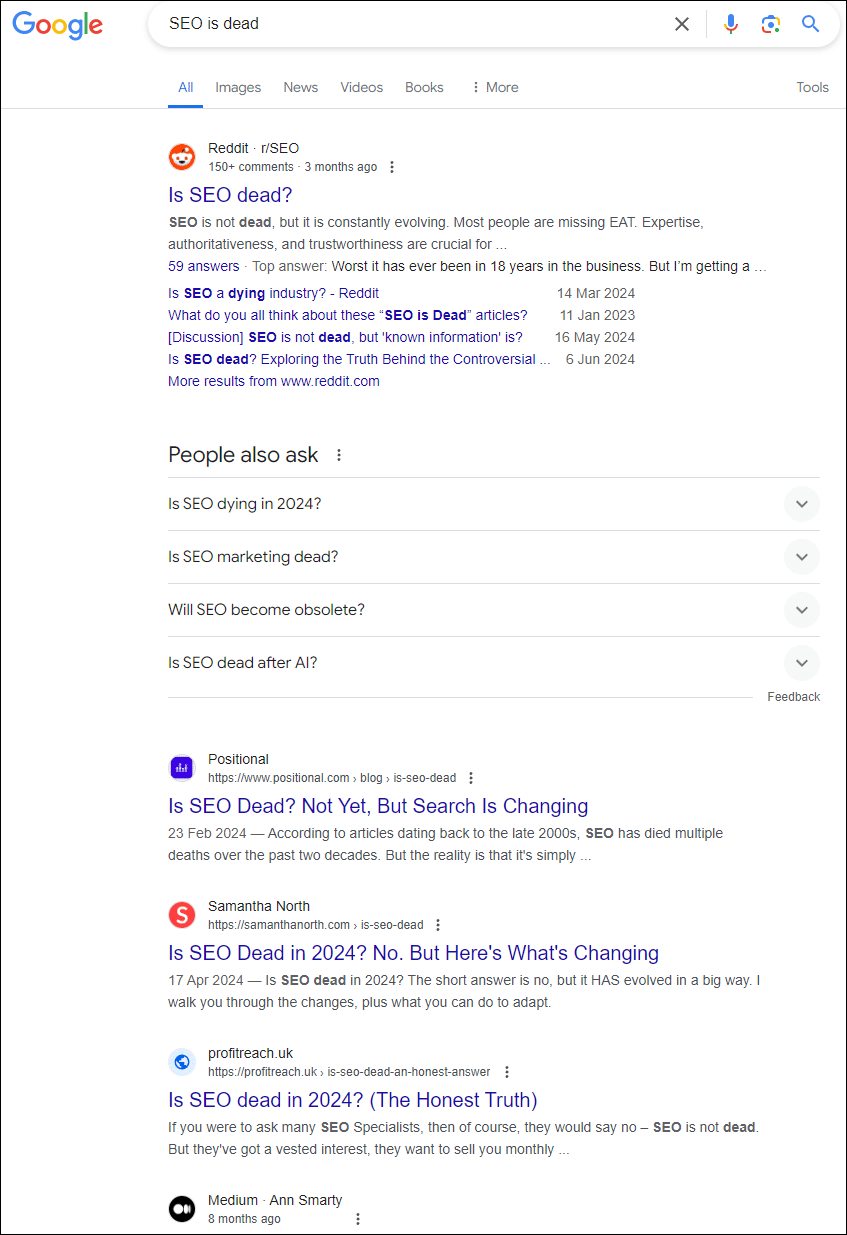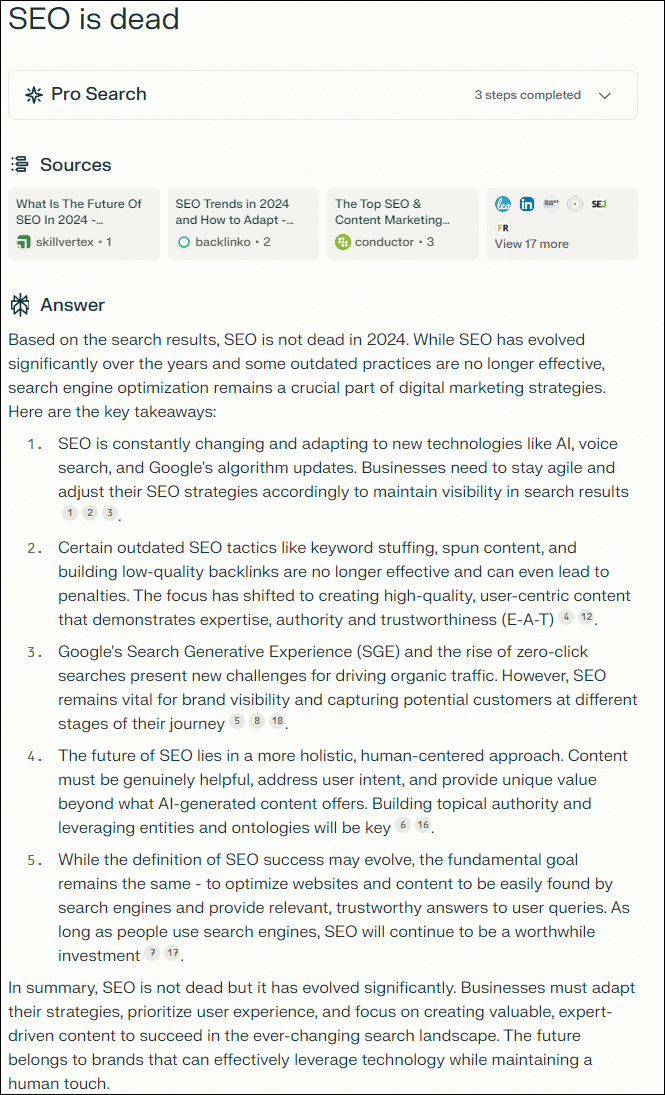I suspect you’ve heard this before: SEO is dead.
Finished.
Again.
It’s a bold claim, or it would be, if it wasn’t so over-used.
As someone who’s worked in digital marketing for over twenty years, I can usually tell you with certainty that the reports of SEO’s death have been greatly exaggerated.
The predictions have always proven to be incorrect.
But today, something has changed.
Today, I think that SEO might be starting to die.
It still has a long life ahead, but the process has begun.
Why has SEO always been about to die?
It hasn’t.
A lot of the claims have been down to sensationalism and attention-seeking. Partly due to a fundamental misunderstanding of what the reality of SEO entails.
The early days of dodgy techniques like keyword stuffing and backlink spamming were quickly rendered obsolete by smarter algorithms.
But SEO didn’t die with each tactic.
Yet every time Google rolled out a major update to combat the tricks, the bloggers and self-proclaimed experts would declare SEO dead.
But being forced to adapt to algorithm changes didn’t signify the end of SEO.
So, the “SEO is dead” idea generated little more than a polite yawn from me. On a good day.
Until now.
This time, it feels different.
This time, I’m starting to see a pattern.
Eyes, blinkers and 360 degrees
I think that the majority of SEO professionals in the industry, or people just using SEO to get more traffic, are effectively looking straight ahead.
They have their eyes wide open, and are facing forward to try to see what may be coming.
The more cautious in this group, however, have removed their blinkers.
They’re scanning a 360-degree circle around them. And they’re as interested in what might come from the side or behind, as what might come from ahead.
And then there are the more enlightened few, who are doing the same thing, but also casting regular glances above them, to see if something out of the ordinary is about to drop on top of them.
This time, however, I feel that the changes are coming from underneath.
And they’re different from anything we’ve seen before.
They’re not coming from Google, or even how people are engaging with their systems.
The changes are about how people are starting to use the web in a new way.
Extinction or Evolution – what’s going on?
A fundamental change has begun.
Some time ago, I used a paid account for chatGPT.
And it blew me away.
Initially, I used it mainly for convenience.
Then I realised it could rewrite, brainstorm, proofread, analyse, research, and annotate.
That was just the beginning of it.
I started using it to cite my writings, summarise content, break down tasks, advise, compare, translate, provide step-by-step instructions, create characters for writing and more.
To provide you with context, I started using Google before most people had even heard of it.
Yet here I was turning to my current AI tool of choice, Perplexity, to sift through the answers for me and give me exactly what I wanted. Not Google.
Instead of links, I was getting answers.
Recently, I was having problems with my internet router and a Sonos. It was late at night, I just needed it to work, and I was going crazy.
A few minutes on Google proved to be futile.
I knew the answers were there somewhere, but they were buried under a large pile of opinions and comments.
The signal-to-noise ratio was terrible.
On impulse, I typed my question into Perplexity and, literally within 30 seconds, had the exact solution to my problem. Complete with link citations for if I wanted to dig further or verify.
I know this is a trivial example.
I’m one person and more technical than most of my friends.
But I’m also in my mid-50s. And I don’t generally embrace the idea of change.
This particular change, however, makes my life easier than it was.
Since then, I’ve used it to research buying a new lawn mower (I told you I was old), find alternative software solutions, exchange rate patterns, help with software, investment opportunities, research sleep disorders, the best replacement printer for my needs, an issue with aligning a blade on a mitre saw and so much more.
It’s breathtaking.
And I don’t think the genie will ever squeeze back into the bottle again.
That said, being of a certain age, I’ve seen many impressive technologies emerge, before quietly fizzling out. A surprising number in fact.
There’s a reason for that.
There are hurdles to new technology taking hold
New technology, to me at least, is interesting and exciting.
But to catch on beyond the techies and enthusiasts, just having a good idea or product isn’t enough.
At this point it’s nothing more than the spark. It has to catch.
New technology has several hurdles before it starts to become even vaguely mainstream:
- How difficult will it be to learn how to use it?
- How much pain will be involved in transitioning from the current solution?
- How much will someone have to pay to use it?
- Is it solving a problem that people know they have?
When it comes to using AI tools, at least the better non-technical and user-friendly options, the answer to these questions is impressive.
They’re simple to use, with no learning curve, and for the most part are free.
They also mean that we don’t have to wade through endless links to find what we’re looking for.
In other words, there is almost no reason why anyone shouldn’t start using a tool like Perplexity today.
You don’t even have to register to use it.
And, taking the unscientific approach to epic levels, I believe that if I sat down with a random assortment of friends, in literally a few minutes, I could convince more than half of them to start using it.
To me, that’s incredible. My friends would usually, at best, nod politely then change the subject. It’s surprising how often that happens.
But this is something that all of them could use to make their lives a little easier.
For years, I believed that Google would eventually be replaced by a different Google.
Not any more.
Now I’m convinced that change is coming from underneath.
I don’t think it’ll happen overnight. I think it’ll take years.
But it’s going to have a greater impact on how we use the web than anything we’ve seen to date.
This isn’t more AI hype
It isn’t an abstract idea, and the process is already underway.
A recent article by Josh Howarth of ExplodingTopics produced some incredible statistics.
Not only is the global AI market already valued at over $196 billion, but an estimated 48% of businesses are now using AI to use big data effectively.
48%!
Netflix, for example, are thought to make $1 Billion annually from automated personalized recommendations.
And the same article estimates that by 2025, as many as 97 million people may work in the AI space.
Aside from their own dedicated AI tools, even Google are starting to use AI Overviews that appear at the top of some search results.
All of which reminds me of the Henry Ford quote about people wanting faster horses.
Users don’t want a better search engine. Google already did that.
They want a better way of finding the answers.
And I think that better way has arrived.
It’s a little rough and ready, but this is the start of it.
This isn’t some weird navel gazing into the future.
This is happening today.
And there’ll be more of it tomorrow.
So where is SEO headed?
A world where AI rules? Where our artificial overlords take decisions on our behalf?
Where AI decides what we should see, and how we should see it?
We’re already there.
Most of us go to Google for our answers. For trivia, facts, figures, prices, information, rates, news, opinions and more.
In this way, most of us constantly feed Google with an endless stream of data.
Google know what I search for. They know me.
They also host my emails (work and personal), follow me around the world with Google Maps and Waze, and so much more.
I know I’m the product, and I give a lot to the machine. More than I realise. Possibly more than I should.
We all do.
Go to Google’s ad personalisation page.
Then have a look at Google’s dashboard for you.
Then, if that wasn’t enough, have a look at My Activity.
And that’s really the thinnest little sliver at the very top of the tip of the iceberg.
We’re already long past the point where a system decides what we should see and how we should see it.
The impact of AI on SEO is still unfolding, but your strategies are going to have to adapt.
Understanding these new trends and opportunities, and integrating them into your content strategy is crucial. However, SEO will fit into it.
So perhaps, in the future, there will be no Search Engine, as such, in SEO.
But people like me will be optimizing for something
So SEO is already dead? What should we do about it?
I don’t think SEO is dead. Not yet. Not by a long shot.
But I do believe that a countdown clock has begun to tick.
Even if the ticking will continue for many years yet.
But if, or when, people start to use Google less, it will invariably start to prove less important to businesses.
I think the process will initially be slow. Glacially so.
But we’re slowly getting ever closer to the tipping point—the point where the trend gains enough momentum for most of us to feel it.
When this happens, when people start to use Google less, they’ll use something else as an alternative.
The demand won’t go away – it’ll just move to a different platform.
Whatever that will be, some sort of system will run the machine that people turn to.
And where there’s a system, there are always possibilities to improve how it handles and understands your content, delivery, voice and ideas.
My advice would be to stay ahead of the curve.
More so than in the past.
When tools come out to make your content more visible and understandable to the new AI, use them. Don’t wait.
When significantly new AI tools emerge and are discussed, listen and try them for yourself. Don’t wait.
Once your industry peers are talking about them, it’ll already be too late to seize the advantage.
I remember how the internet caught on. How SEO caught on.
By the time most businesses realised the importance, the early adopters already had a vital head start.
Now’s the time to be the early adopter, even if it might not come naturally to you.
As of today, the time to debate the existentialism of SEO is behind us.
SEO is dead, even if it doesn’t know it. Long live the O.
Unique ideas for your business
The Demystifier puts practical ideas into your hands. You won't find them elsewhere. Original, actionable and insanely effective.






